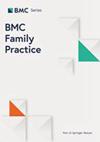初级保健实践中的自我管理支持(SMS):对专业护理人员经验的焦点小组定性研究
IF 3.2
3区 医学
Q1 MEDICINE, GENERAL & INTERNAL
引用次数: 0
摘要
为了支持慢性病患者的自我管理,人们正在开发创新的护理实践方法。遗憾的是,许多支持自我管理的干预措施在各个层面(患者、医疗服务提供者和医疗保健系统层面)都难以取得可靠和持续的改善。促进将理论转化为实践的一个可行策略是,在开发新的干预措施之前,考虑医疗保健专业人员的观点。在采用任何自我管理支持(SMS)干预措施之前,有必要了解他们对障碍和促进因素的认识和看法。因此,我们的研究旨在探索弗拉芒初级医疗机构中医疗专业人员对 SMS 的看法。本研究采用定性研究设计来考察基层医疗机构的 SMS 情况。共进行了五次焦点小组讨论,分为三波。参与者是佛兰德斯的医疗保健专业人员,他们代表了不同的学科和环境。在招募参与者时采用了最大差异目的性抽样。数据分析采用了 Attride-Stirling 的主题网络框架。共有 34 名医疗保健专业人员参与了调查。专题分析得出了与 SMS 相关的三个总体主题:(1)特点;(2)支持策略;(3)障碍和促进因素。SMS 被认为是一种以合作为基础、以人为本的方法。焦点小组参与者提到了各种支持策略。大多数策略包括向患者提供信息和教育。作为个人策略的补充,协作策略被认为是支持自我管理的必要手段。关于障碍和促进因素,与患者相关的因素各不相同。此外,医疗服务提供者的能力和外部因素似乎也阻碍了 SMS 在实践中的实施。这项焦点小组研究强调了在慢性病背景下,以人为本的协作式 SMS 方法的重要性。我们的研究结果表明,有必要采取干预措施,提高人们对 SMS 的认识,并消除与 SMS 相关的障碍。由于不存在通用的 SMS,因此通往成功的道路是一个成长的过程,在这个过程中,必须根据患者的具体情况提供相应的支持。本文章由计算机程序翻译,如有差异,请以英文原文为准。
Self-management support (SMS) in primary care practice: a qualitative focus group study of care professionals’ experiences
To support self-management of chronically ill persons, innovative approaches of care practice are being developed. Unfortunately, many self-management supporting interventions struggle to achieve reliable and consistent improvements at various levels (patient, provider and healthcare system level). One possible strategy to facilitate translating theory into practice, is to consider the healthcare professionals’ perspective prior to the development of new interventions. An exploration of their knowledge and opinion about barriers and facilitators is necessary before employing any self-management support (SMS) intervention. Therefore, our study aims to explore care professionals’ perspectives about SMS within the Flemish primary care setting. This study used a qualitative study design to examine SMS in primary care setting. Five focus groups were conducted, grouped into three waves. Participants were healthcare professionals in Flanders representing different disciplines and settings. A maximum variation purposive sampling was used to recruit participants. For the data analysis, the framework of thematic networks by Attride-Stirling was applied. A total of 34 healthcare professionals participated. Three global themes related to SMS were derived from the thematic analysis: (1) Characteristics, (2) Support strategies, (3) Barriers and facilitators. SMS was characterised as a collaboration-based and person-centred approach. A variety of supporting strategies were mentioned by the focus group participants. Most strategies consisted of informing and educating patients. Complementary to individual strategies, collaborative strategies were deemed necessary to support self-management. Regarding barriers and facilitators, different patient-related factors were identified. Additionally, competencies of healthcare providers and external factors seem to hinder the implementation of SMS in practice. This focus group study highlights the importance of a collaborative, person-centred approach to SMS in the context of chronic diseases. Our findings point to the need for interventions that raise awareness and address barriers associated with SMS. Since generic SMS does not exist, the road to success is a growth process in which support must be adapted to the individual patient.
求助全文
通过发布文献求助,成功后即可免费获取论文全文。
去求助
来源期刊

BMC Family Practice
医学-医学:内科
CiteScore
3.20
自引率
0.00%
发文量
0
审稿时长
4-8 weeks
期刊介绍:
BMC Family Practice is an open access, peer-reviewed journal that considers articles on all aspects of primary health care research. The journal has a special focus on clinical decision making and management, continuing professional education, service utilization, needs and demand, and the organization and delivery of primary care and care in the community.
 求助内容:
求助内容: 应助结果提醒方式:
应助结果提醒方式:


